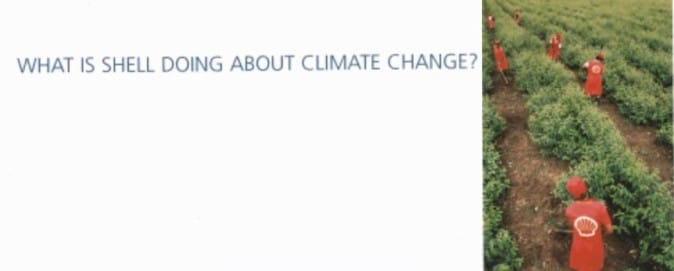“Climate Change: What does Shell think and do about it?” is a 1998 handout from a trove of Royal Dutch/Shell Group (“Shell”) documents unearthed by Jelmer Mommers of De Correspondent. Printed to explain the science of climate change and what the company was doing to address it, Shell resisted calling climate change a threat, but acknowledged that it was happening and may get worse. The company stated, “we don’t know whether [climate change] will be catastrophic, or whether it might be slightly beneficial,” but “we believe that prudent precautionary measures are now necessary.” Despite their seemingly pro-active stance on climate change, Shell used this handout to encourage more fossil fuel exploration, extraction, and utility-scale demand.
Answering “What Is Shell Doing About Climate Change?,” the first three solutions highlighted are: to “continue to produce oil and gas,” to “provide more natural gas,” and to “develop [Shell’s] business in gas-fired power generation.” Shell explained that they need to “continue to find more [hydrocarbon] reserves” in order to fuel the next few decades of economic growth in developing countries. Not relying solely on fossil fuel production, they also set out to “develop renewable energy sources” and “reduce emissions of greenhouse gases” from within the company and through their customers’ use of Shell products.
Shell repeatedly emphasized natural gas over coal, using coal’s higher rate of CO2 emissions to justify ramping up gas’ role in the market. In their “What Shapes Our Thinking” section, Shell explained that if we burned all of our “known and probable” oil and gas reserves, it would lead to CO2 levels in the atmosphere “well below” the target proposed by the EU. To Shell, this is a success in potential emission reductions because if the same amount of oil and gas was burned, but with coal included, it would be twice the EU limit. “At the very least,” the report stated, “mankind is carrying out a risky experiment with the planet by raising the levels of greenhouse gases in the atmosphere to levels far above any seen in the last 150,000 years or more.”
Despite Shell claiming they support the Kyoto Protocol and that they want to take the precautionary route on climate change, their principal solutions to CO2 emission reductions involve consuming and extracting more oil and gas.
Interested in more Shell documents? Full index here.


